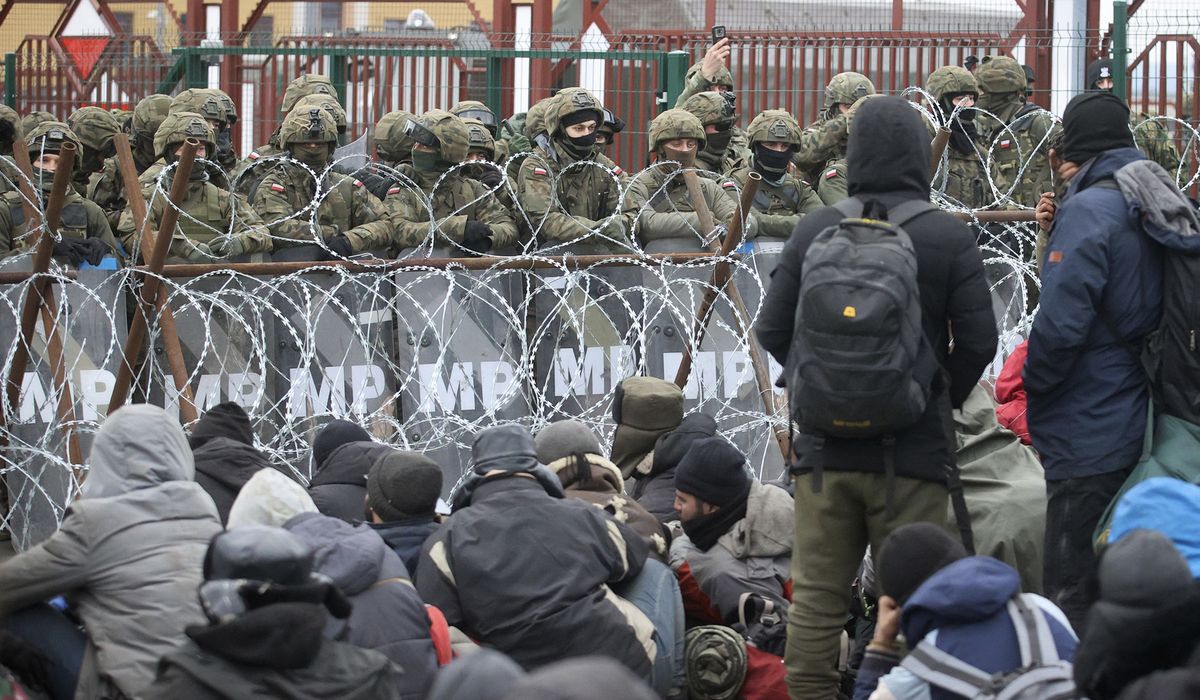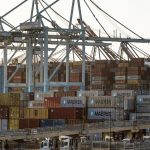
Outrage among European Union officials who say Belarus is deliberately trying to flood Middle Eastern migrants into Poland and Lithuania reached new heights Monday, with the EU announcing it will sanction airlines that arranged special deals to fly the migrants into Belarus in recent months.
The announcement comes after European Commission President Ursula von der Leyen accused Belarusian President Alexander Lukashenko of engineering the migrant surge as part of a “hybrid attack” against the EU. Analysts claim the Lukashenko government‘s goal is to foment EU political divisions over immigration and destabilize Poland and Lithuania — two pro-democracy EU member nations — as a way to ease the pressure on his own regime.
The clash has again put landlocked Belarus at the heart of an international crisis, with the U.S. and Russia drawn in and on opposite sides.
Belarusian officials dismissed the EU allegations Monday. “We don’t have to coordinate anything, the refugees themselves say where they are going and why,” a Belarusian foreign ministry spokesman said, according to Russia‘s TASS news agency. “We are a transit country in this case.”
The Biden administration has tied the developments to the Kremlin, claiming that Belarus is actually being used by Russian President Vladimir Putin’s government to signal his unhappiness with the U.S. and its Western allies, and to cloak Moscow’s border troop build-up and military intimidation campaign targeting Ukraine.
“The actions by the Lukashenko regime threaten security, sow division, and aim to distract from Russia’s activities on the border with Ukraine,” State Department spokesperson Ned Price said Sunday.
Up to 4,000 migrants are presently in makeshift camps in freezing weather along the Belarusian side of the border with Poland, according to The Associated Press. Recent attempts to crash through the border — and into the EU — have been met with force from Warsaw.
Poland has recently reinforced the border with 15,000 troops, in addition to border guards and police. Lithuanian officials say they too see a rising number of attempts by migrants to cross into Lithuania from Belarus, but that the situation on the border is under control.
The surge of migrants has been building for months. A New York Times report over the weekend cited Iraqi travel agents who said Belarus loosened its visa rules in August, making flights from Iraq an easier journey to Europe than traveling by land to Turkey and attempting a dangerous sea crossing into Greece. There were even package deals to travel to Belarus and obtain accommodations for a couple of days, presumably in preparation for a bid to cross into an EU country.
Many of the migrants stuck on the Polish border are thought to be trying to head west, toward Germany. Polish authorities said Monday that Belarus officials had led a large group to a border crossing with Poland and made them believe they would be transported by bus to Germany. Polish police say they are broadcasting messages across the border telling the migrants that “they have been deceived.”
‘Opportunistic’
Germany is the sought-after destination not only because of its prosperity but because it gained a reputation for granting asylum to Arab and Muslim refugees from Syria’s civil war back from 2014 to 2016, when well over 1 million refugees came into Western Europe and Berlin agreed to take the bulk of them.
The previous surge triggered sharp political divisions in Germany and several other Western European nations — a reality that the Putin government sought to exploit as part of its ongoing attempts to sow discord among NATO-member nations.
“It stimulated the rise of anti-immigrant and extremist parties,” said Donald Jensen, who heads the Russia and Strategic Stability project at the United States Institute of Peace.
Mr. Jensen told The Washington Times on Monday that the Kremlin is “opportunistic” and eager to exploit the current crisis to Russia‘s advantage in the region. He stressed, however, that the dynamics unfolding in Belarus are complex, and that it is unclear whether Moscow, the Lukashenko government, or some combination of both is responsible for orchestrating the current border crisis.
The region has become a tinderbox in recent years, with Russia supporting pro-Moscow separatists fighting the Ukrainian government and moving closer to the Lukashenko regime in Belarus, where Mr. Lukashenko was nearly toppled by opposition protests last year and has clashed with neighbors over human rights abuses.
Few dispute that Mr. Lukashenko has increasingly aligned himself with the more powerful Mr. Putin over the past year. “But it’s not clear whether the dog is waging the tail or the tail is wagging the dog with this migrant surge,” said Mr. Jensen.
“It may well be that this was cooked up by the Kremlin using Lukashenko to pressure the European Union,” he said. “But you also have Lukashenko trying to maneuver Putin into a position where he has some wiggle room to remain as Belarusian leader. We’ve seen Belarus drifting toward Kremlin dependence, and my view is that Lukashenko is trying to resist that. So what he‘s done here is create this crisis, and now the Kremlin either has to back him up or not.”
Either way, the Russia–Belarus alliance is being tested amid widening regional tensions.
A focus on Ukraine
Many in the region say the developments involving migrants, as well as a widening energy crisis across Western Europe, can be traced back to Moscow, which denies it is exploiting its dominance over natural gas and oil markets as a political tool to exert influence over the region.
Ukraine in particular has been vocal about the need for clear signs of support from Washington and the EU to counter what it says is a multifaceted pressure campaign orchestrated by Moscow.
“We should all understand that what is unfolding in Europe now is a very complicated game with many elements in it: energy crisis, propaganda efforts, disinformation, cyberattacks, military buildups, an attempt of Russia to digest Belarus [and] elements of [a] migration crisis,” Mr. Kuleba said Wednesday.
“We have to remain vigilant,” the Ukrainian foreign minister said. “We have to be resilient.”
The Biden administration’s approach has centered heavily on Ukraine, long a friction point between the West and post-Soviet Russia and whose battles with corruption have become interwoven with U.S. domestic politics in recent years.
Administration officials last week said they fear Russian forces may be on the verge of entering Ukraine to “rehash” the chaos that resulted in Moscow’s annexation of Crimea in 2014, warning the Kremlin that the U.S. and its allies are committed to helping Ukraine defend itself.
NATO Secretary-General Jens Stoltenberg said in Brussels on Monday that the military alliance was watching Russia‘s moves against Ukraine warily, but seemed to tamp down speculation in Washington that a military invasion by the Kremlin could be in the offing.
“I think it’s important also that we don’t now increase tensions, but we have to be clear-eyed, we need to be realistic about the challenges we face,” he said after a meeting with Mr. Kuleba.
The 27-country EU has already imposed four sets of sanctions on Belarus authorities and senior officials over the widely disputed election in August last year that returned Mr. Lukashenko to office and the security crackdown on peaceful protesters that followed. The onetime Soviet farm manager has now been in power in Minsk since July of 1994, shortly after the country broke away from the collapsing Soviet Union.
The EU is preparing a fifth round of sanctions, and on Monday the bloc’s foreign ministers extended the scope of those measures to add airlines, travel agents and others accused of helping to bring migrants to Minsk.
“Today’s decision reflects the determination by the European Union to stand up to the instrumentalization of migrants for political purposes. We are pushing back on this inhuman and illegal practice,” EU foreign policy chief Josep Borrell said in a statement.
EU headquarters said the bloc will now be able to target individuals and entities organizing or contributing to activities by the Lukashenko regime that facilitate illegal crossing of the EU‘s borders. A list of those to be hit by the asset freezes and travel bans is expected to be finalized in coming days.
In Washington, the State Department‘s Mr. Price said Washington is also “preparing follow-up sanctions in close coordination with the EU and other partners and allies that will continue to hold the Lukashenko regime accountable for its ongoing attacks on democracy, on human rights, on international norms.”
The Lukashenko government hit back at the EU after Monday’s announcement. “We will have to react most toughly,” the Belarus foreign ministry spokesperson said, according to TASS.
“We defend our independence and will be ready to take any, even most tough measures,” the spokesperson said. “What kind [of measures], this will be decided by the government that has plans of action to any development of the situation.”
• This article is based in part on wire service reports.








